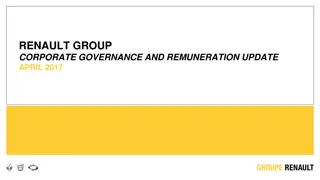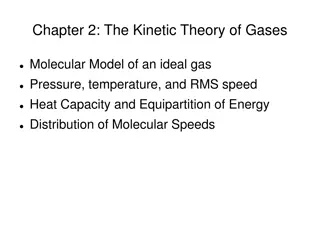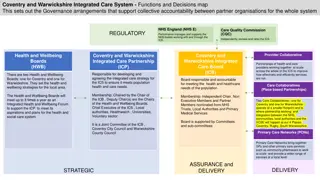Importance of Ideal Remuneration System and Factors Influencing It
Establishing an ideal remuneration system is crucial for organizations as it impacts employee motivation, retention, and overall performance. External factors like labor market conditions, cost of living, labor unions, and societal expectations play a role in determining wages. Additionally, internal factors such as business strategy, organizational culture, and job requirements also influence remuneration decisions. Understanding and balancing these factors is essential for creating a fair and competitive compensation structure.
Download Presentation

Please find below an Image/Link to download the presentation.
The content on the website is provided AS IS for your information and personal use only. It may not be sold, licensed, or shared on other websites without obtaining consent from the author.If you encounter any issues during the download, it is possible that the publisher has removed the file from their server.
You are allowed to download the files provided on this website for personal or commercial use, subject to the condition that they are used lawfully. All files are the property of their respective owners.
The content on the website is provided AS IS for your information and personal use only. It may not be sold, licensed, or shared on other websites without obtaining consent from the author.
E N D
Presentation Transcript
IMPORTANCE OF IDEAL REMUNERATION SYSTEM UNIT-3
FACTORS INFLUENCING REMUNERATION SYSTEM External Factors Internal Factors
External Factors External Factors Labour Market Demand for and supply of labour influence wage and salary fixation. A low wage may be fixed when the supply of labour exceeds the demand for it. A higher wage will have to be paid when the demand exceeds supply, as in the case of skilled labour. Cost of Living Next in importance to labour market is the cost of living. This criterion matters during periods of rising prices, and is forgotten when prices are stable or falling. The justification for cost of living as a criterion for wage fixation is that the real wages of workers should not be allowed to be whittled down by price increases. A rise in the cost of living is sought to be compensated by payment of dearness allowance, basic pay to remain undisturbed. Many companies include an escalatory clause in their wage agreements in terms of which dearness allowance increases or decreases depending upon the movement of consumer price index (CPI).
External Factors External Factors Labour Unions The presence or absence of labour organizations often determine the quantum of wages paid to employees. Employers in non-unionized factories enjoy the freedom to fix wages and salaries as they please. Because of large-scale unemployment, these employers hire workers at little or even less than legal minimum wages. Labour Laws We have a plethora of labour laws at the central as well as at the state levels. Some of the central laws which have a bearing on employee remuneration are the Payment of Wages Act, 1936; the Minimum Wages Act, 1948; the Payment of Bonus Act, 1965; Equal Remuneration Act, 1976; and the Payment of Gratuity Act, 1972. The Payment of Wages Act was passed to regulate payment of wages to certain classes of persons employed in the industry.
External Factors External Factors Society Remuneration paid to employees is reflected in the prices fixed by an organization for its goods and services. For this reason, the consuming public is interested in remuneration decisions. The Supreme Court, from its very inception, has had to adjudicate industrial disputes-particularly disputes relating to wages and allied problems of financial concern to the worker- an ethical and social outlook liberally interpreting the spirit of the Constitution. The Economy The last external factor that has its impact on wage and salary fixation is the state of the economy. While it is possible for some organizations to thrive in a recession, there is no question that the economy affects remuneration decisions. For example, a depressed economy will probably increase the labour supply. This, in turn, should serve to lower the going wage rate.
Internal Factors Business Strategy The overall strategy which a company pursues should determine the remuneration to its employees. Where the strategy of the enterprise is to achieve rapid growth, remuneration should be higher than what competitors pay. Where the strategy is to maintain and protect current earnings, because of the declining fortunes of the company, remuneration level needs to be average or even below average. Job Evaluation and Performance Appraisal Job evaluation helps establish satisfactory wage differentials among jobs. Performance appraisal helps award pay increases to employees who show improved performance. The Employee Several employee-related factors interact to determine his or her remuneration. These include performance, seniority, experience, potential, and even sheer luck.
IMPORTANCE OF IDEAL IMPORTANCE OF IDEAL REMUNERATION SYSTEM REMUNERATION SYSTEM
IMPORTANCE OF IDEAL IMPORTANCE OF IDEAL REMUNERATION SYSTEM REMUNERATION SYSTEM Attracting Top Talent People are always looking to put themselves in the best possible position financially. Those who are worth a specific salary amount often know their value and will seek a position that pays accordingly. Do research on what your competitor's compensation and benefits packages look like. Make sure you offer a similar package to your potential employees so that you attract the best candidates for your company. Hiring the right candidate the first time reduces recruiting costs and helps free up business owners for other tasks.
IMPORTANCE OF IDEAL IMPORTANCE OF IDEAL REMUNERATION SYSTEM REMUNERATION SYSTEM Increased Employee Motivation Properly compensating employees shows you value them as workers and as human beings. When people feel valued, they feel better about coming in to work. Overall company morale increases and people are motivated to come to work and do a good job. Additionally, when employees know there are bonuses or commissions, they are increasingly motivated to deliver grander results. Bonus and commission compensation plans become a focal point for success.
IMPORTANCE OF IDEAL IMPORTANCE OF IDEAL REMUNERATION SYSTEM REMUNERATION SYSTEM Increased Employee Motivation
IMPORTANCE OF IDEAL IMPORTANCE OF IDEAL REMUNERATION SYSTEM REMUNERATION SYSTEM Boost Employee Loyalty When employees are being paid well and are happy, they're likely to stay with the company. Proper compensation is one factor why employees remain with employers. Loyalty means that business owners don't need to continue to spend time, money and energy on recruiting new candidates. Employee retention and low-turnover rates are great for employers who cultivate a team that knows what to do. That team is also motivated to be part of the team, and they get the job done well.
IMPORTANCE OF IDEAL IMPORTANCE OF IDEAL REMUNERATION SYSTEM REMUNERATION SYSTEM Increased Productivity and Profitability Happy employees are productive employees. Productivity in relation to compensation starts with employees feeling valued which increases motivation and loyalty. Not only are employees more motivated to do a good job, but also, the longer people are with the company, the more they know and the more efficient they become. All of this leads to increased productivity.
IMPORTANCE OF IDEAL IMPORTANCE OF IDEAL REMUNERATION SYSTEM REMUNERATION SYSTEM Job Satisfaction So People Stay Creating the right compensation plan leads to stronger job satisfaction. The right compensation plan includes benefits, along with all the other bonuses available. Employees often boast about holiday bonuses or they keenly watch how the company stock performs because they have stock options. The right compensation program invests employees into the work being done, which gives them a stronger sense of satisfaction when the company succeeds. They know they will be rewarded for their efforts; everyone likes to be appreciated.
REMUNERATION PLAN & BUSINESS STRATEGY Business Strategy Market Position & Maturity Invest to Grow Merging or growth rapidly Remuneration Strategy Simulate entrepreneurialism Blend of Remuneration High Cash / Average Incentives/ Modest Benefits Manage earnings protect markets Normal growth to maturity Reward management skills Average Cash / Moderate Incentives/ Standard Benefits Harvest earnings reinvest elsewhere No real growth or decline Stress on cost control Below Average Cash/ Small Incentives/ Standard Benefits
Devising a remuneration plan Job Description Job Evaluation Job hierarchy Pay Survey Pricing jobs
Devising a remuneration plan Job Description Job descriptions are crucial in designing pay systems, for, they help to identify important job characteristics. They also help determine, define and weigh compensable factors (factors for which an organization is willing to pay- skill, experience, effort and working environment). Job Evaluation The next step in pay fixation is to establish relative worth of jobs by employing job evaluation. A number of techniques are available to evaluate jobs. For example, in the point-ranking method of job evaluation, each job is analyzed and defined in terms of the compensable factors an organization has agreed to adopt. Points are assigned to each .degree of a compensable factor, such as responsibility.
Devising a remuneration plan Job Hierarchy The points assigned to all compensable factors are aggregated. The total points scored will help establish the hierarchy of job worth, starting from the highest point total to the lowest point total. Pay Survey Job hierarchy being established, the next step is to establish pay differentials. Before fixing wage and salary differentials, prevailing wage and salary rates in the labour market need to be ascertained. Hence the relevance of pay surveys. Pricing Jobs In pricing jobs, the job evaluation worth is matched with the labour-market worth. Two activities need to be performed: (i) establishing the appropriate pay level for each job, and (ii) grouping the different pay levels into pay grades.
Challenges to Remuneration Skill- based pay Employee participa tion Salary reviews Remuneration Comparable worth Pay secrecy
Challenges to Remuneration Skill-Based Pay :In the skill based system, workers are paid on the basis of number of jobs they are capable of doing, or on depth of their knowledge. The purpose of this system is to motivate employees to acquire additional skills so that they become more useful to the organization.
Challenges to Remuneration Salary Reviews : Salary, once determined, should not remain constant. It must be reviewed and challenged often, but how often becomes a relevant question. Pay reviews may be made on predetermined dates, anniversary dates or there could be flexible reviews. In the fixed-date reviews, wages and salaries of all employees are reviewed and raised on a specified date each year. In the anniversary-date review, salaries may be reviewed at twelve-month intervals from the date of the employee s anniversary date of hire. Using variable timing ensures flexibility. In addition, high-performing employees, who are low on their salary ranges, can be rewarded more frequently
Challenges to Remuneration Pay Secrecy : The process by which a remuneration plan is designed and administered is critical for any organization. One challenge facing HRM concerns the availability of information about remuneration to employees. The tendency among most firms is to maintain pay secrecy as this would help avoid pay comparisons likely to be made by employees
Challenges to Remuneration Comparable Worth :One of the popular principles in employee remuneration is equal pay for work. Infact, this principle has been the inspiration behind the enactment the Equal Remuneration Act. Under the act, male and female nurses are to be paid the same if their merit and seniority match, but a female and a male electrician could be paid different rates.
Challenges to Remuneration Employee Participation :When employees are involved in designing a remuneration plan, they exhibit little resistance in accepting it. Such a plan is much more likely to be a successful motivator than the one imposed by the management.























